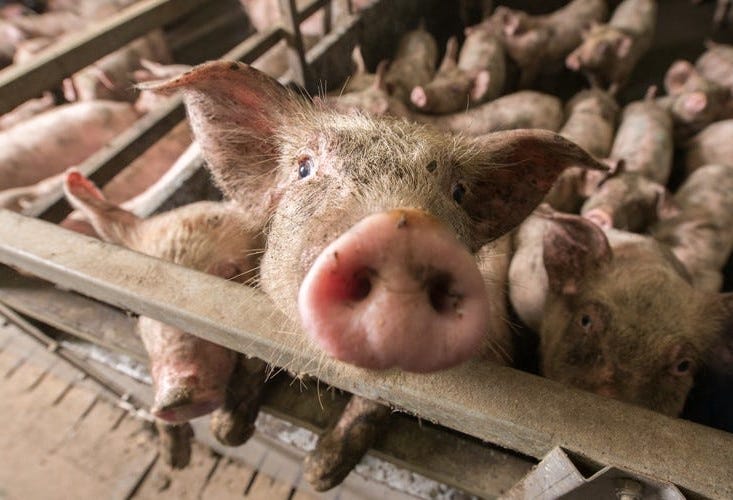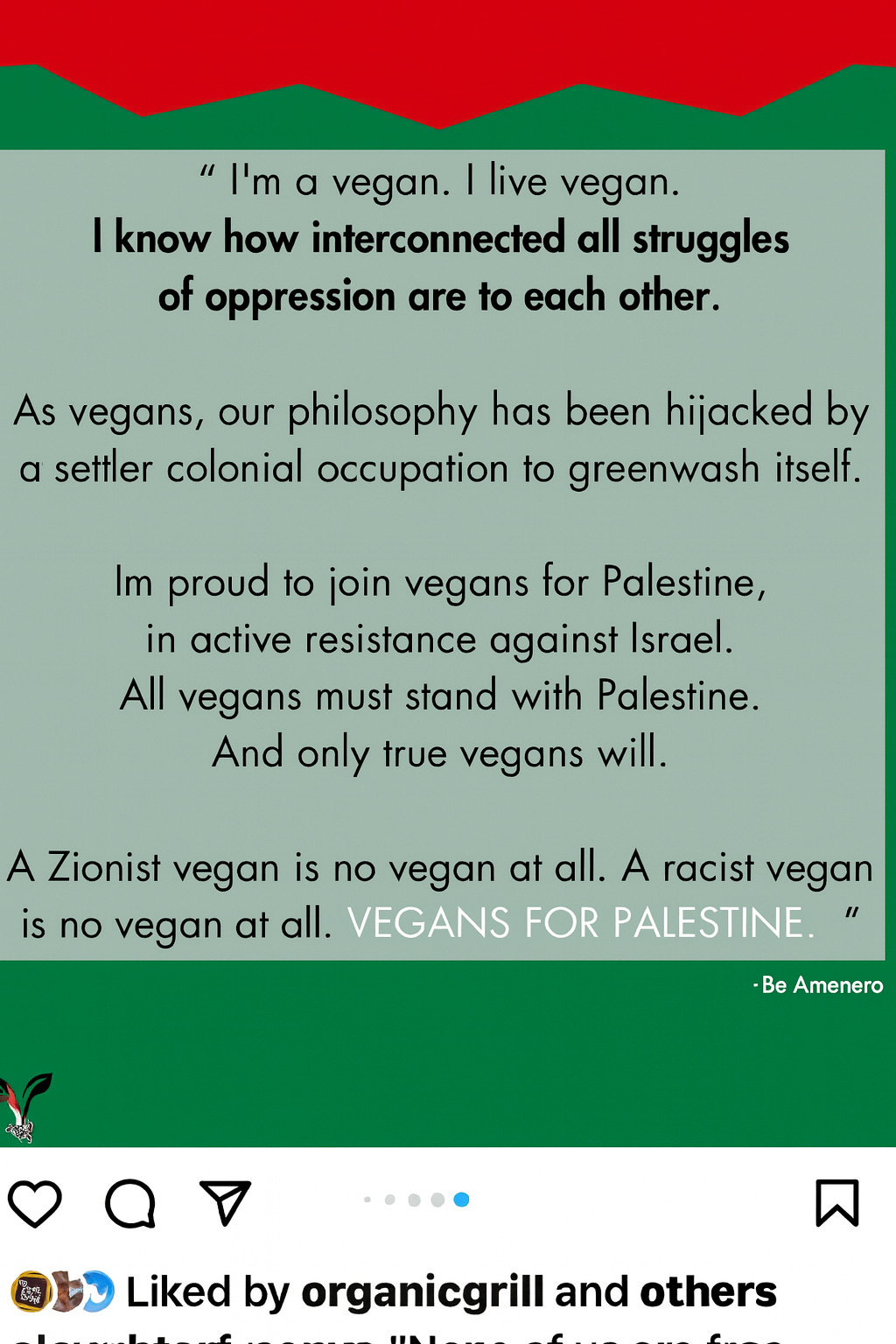Hijacking the Animal Movement
The call to boycott Jewish-owned vegan restaurants is a betrayal of animals and the people helping them
Imagine that our society were to disappear, and with it, our historical record. Thousands of years from now, what will archaeologists think about us as they attempt to reconstruct our society from the remains they find?
As plastics, wood, and other materials decay, archaeologists will find the same remnants archaeologists uncover today: bones. And since the largest volume of bones is not human, they will primarily find chicken bones. We slaughter approximately 81 billion chickens each year worldwide, resulting in around 20 million metric tons of bones annually. Next, they will discover cow bones (18 million metric tons), then pig bones (15 million metric tons), as well as sheep and goat bones (1.8 million metric tons).1
Assuming they are morally evolved, they will conclude that we were extremely violent to our fellow earthlings. And they would be right. Approximately 90 billion land animals are raised and slaughtered annually for the nutrients and calories that can be obtained from plants. That’s a colossal number, but it pales in comparison to the number of fish killed to be eaten each year: about one trillion, of which more than half now come from aquatic factory farms. In terms of sheer numbers and brutal conditions, raising and killing animals for “food” represents the greatest cause of human-induced suffering on the planet.
From the moment they are born until they are killed, most animals raised for food endure lives of unremitting torment. They never know safety, happiness, or kindness. Instead, they suffer inescapable discomfort, social deprivation, and constant stress, all punctuated by moments of pain, fear, and, eventually, a brutal and untimely death. For these animals, Earth resembles the hell envisioned by artists, poets, writers, and preachers.
Given this, organizations whose mission is to advocate for “farmed” animals should be laser-focused on convincing people to embrace plant-based alternatives. Every campaign must be guided by the goal of reducing the number of victims. Before taking action, they must ask themselves: Is this effective? Will this win more converts to veganism? Will this soften hearts, change minds, and, more importantly, result in concrete actions that benefit these animals?
It is an immense responsibility to speak for those who cannot — especially when the stakes are this high. Inevitably, organizations and the people who run them will fall short, given how mechanized, normalized, and invisible this problem has become. After all, most people see only neatly wrapped supermarket packages with cheerful labels of animals frolicking in the sun. But failure should never come from a lack of trying.
Tragically, some of the most notable names in vegan advocacy aren’t trying. Worse still, they are embracing unrelated, antithetical agendas that make things worse for animals. Despite names that suggest otherwise, they suffer from what social and political scientists call “mission creep.” And because they are the most notable names, they are also the most influential, diverting money and activist energy away from the goal of reducing, and someday eliminating, the eating of animals by humans.
For example, some vegan organizations are calling for a boycott of restaurants, but not because they serve meat. Instead, they are calling for a boycott of vegan restaurants because the chefs are Jewish and have not publicly condemned Israel for defending itself against terrorists who rape, burn, mutilate, kidnap, and murder Israeli citizens.
“There is no place for Zionism within the vegan movement,” declared a 14,000-member group of vegans calling for a New York City boycott of Jewish-led vegan restaurants. What does this mean for animals?
Across the country, vegan restaurants are already struggling to survive, with many closing or adding meat to their menus. A boycott, if effective, would further shrink plant-based options. Since lack of convenience is a leading reason people reject veganism, fewer vegan restaurants mean fewer people will try plant-based eating — and of those who do, fewer will stick with it.
As such, one would think that this call to destroy vegan restaurants by vegan organizations would be met with derision. If anything, vegan advocacy groups should encourage people to patronize these businesses as much as possible. Unfortunately, at least three large, well-known organizations — Direct Action Everywhere, the Save Movement, and Generation V — as well as several smaller ones, also took positions equating support for Israel as inconsistent with being vegan, with one of them posting “A Zionist vegan is no vegan at all.”
The claims are inaccurate and counterproductive.
A vegan is someone who avoids animal products, such as meat, dairy, and eggs. That’s it. It doesn’t mean someone who is politically liberal or politically conservative. It does not mean someone who is a capitalist or a communist. It does not mean someone who is an atheist or deeply religious. And it most certainly does not mean someone who supports Palestinian statehood or, conversely, believes that Hamas is an existential threat to the people of Israel. All of those things are irrelevant to whether the person eats animals or does not eat animals. And a vegan could fall on one side, the other side, or anywhere in between on any of these positions and thousands of others.
Of course, that doesn’t mean that all of these positions are equally logical, factual, moral, or conducive to human health, happiness, or flourishing. Far from it. Support for Hamas and its policies would mean a continuation of mass poverty, political corruption, extrajudicial killing by stoning, subjugation and abuse of women, killing of gay people, as well as the rape and murder of Israelis as instruments of state policy. And this much is certain: if Hamas put down their guns, there would be peace. If Israel put down their weapons, there would be a genocide of Jews.
But logic and facts aside, none of this has anything to do with whether someone is vegan because they don’t consume animal products. And demanding adherence to these other things creates additional obstacles to more widespread veganism, taking us further from – not closer to — the goal of ending this form of animal suffering.

Aside from the abuse of people that is endemic to life under Hamas, it also means further abuse of animals. It means more “wet markets” for animals destined for dinner plates and a culture of dog killing. In Islamic jurisprudence, dogs are regarded as najis (impure). That is why the embrace of Islamicism by Turkey’s ruling government led to the mass killing of homeless dogs, who used to be cared for through sterilization and feeding by animal welfare groups. Morocco also rounds up and kills dogs — poisoning, shooting, and trapping them with metal tongs. Dogs are not welcome in the Maldives. And some clerics have issued fatwas against petting puppies. This is unsurprising as there is no tradition of animal rights in fundamentalist Islamic countries. Animals, like women, are less than — far, far less. By contrast, not only is Israel a democracy, with women’s suffrage and marriage equality, it is “one of the most vegan-friendly countries in the world; about 5% of its population follows a plant-based diet, compared with 1.5% in the U.S.” And that is something these groups should care about. Unfortunately, they do not seem to.

This lack of concern is further revealed by their silence toward non-Jewish owners of vegan restaurants. Why aren’t they demanding a boycott of Muslim-owned establishments, given the rape, kidnapping, and massacre of October 7, or the daily violence committed by Islamic governments against their own people, especially women and homosexuals? Why aren’t they calling for a boycott of Russian-owned vegan restaurants because Russia’s brutal invasion of Ukraine has killed hundreds of thousands of animals — zoo animals, shelter animals, community pets, wildlife, and companions — many of them deliberately targeted:
Russian soldiers in retreat from the Kyiv region left behind the bullet-riddled corpses of not just [cows], horses, and goats, but even pet dogs. By killing animals, the invaders seem to be responding to all the pictures of Ukrainians with pets in bomb shelters and evacuation convoys. The Russians have identified yet another way to inflict pain on the Ukrainian people — not by starving them but by breaking their hearts.
They aren’t calling for such boycotts because there is no logical or morally defensible reason to target individuals who happen to share the national, racial, or religious heritage of a country in conflict, especially if they are Americans. Just like the terrorists these activists defend, they are taking the vegan cause hostage, holding a captive bolt pistol to the heads of animals while demanding concessions on political issues unrelated to those animals’ interests and from those who have no power to rectify their particular complaints. But doing so against Jews and only Jews exposes the true motive behind such a boycott: the status now associated with performative anti-Semitism.
Like so many other civil rights issues, the animal protection movement has been hijacked by nihilistic, grievance-driven ideologies in which hating Jews is a prevailing ethos, even though expressing that hate undermines two essential tools to erode the perceived necessity of the slaughterhouse: enlightenment values and plant-based alternatives.
If these groups succeed in causing more vegan restaurants to close with their call for a boycott, nothing will change in Gaza. But from the standpoint of animals, what happens to these restaurants is important because they lessen the demand for meat, milk, and eggs and, therefore, lessen suffering. This isn’t animal advocacy, it’s the antithesis. It’s worse than no advocacy at all, because this type of “advocacy” not only dismantles solutions (more vegans and vegan restaurants), it usurps the infrastructure created for one cause to serve the nefarious purposes of another.
It also destroys the philosophical underpinning upon which the movement is based. To address the misperception that compassion is a zero-sum game, it has long been a pillar of the animal rights movement that the welfare of animals matters, and as a society, we cannot ignore it because humans are also suffering. Now, that message is being undermined by vegans all over the country who are cheering the attempted destruction of vegan restaurants, sending the message to all who are listening that the plight of non-humans is irrelevant and the cause to end their suffering must give way to “more important” human-centric issues.
These groups may have started out to help animals — the jury is out on that — but they have morphed into something else. In the end, they have become little more than self-congratulatory, insular social clubs. A Stanford University study on confrontational protests is instructive: by creating an “us versus them” mentality, groups undermine support for their own cause to provide their members a “social identity” and feelings of “self-worth.” It is pure tribalism.2
And so, while tribal groups with a warped litmus test that demands fealty to a terrorist organization, the oppression of Jews, and support for governments that oppose the classical liberal legal and intellectual infrastructure upon which gaining rights for non-humans depends may brand themselves morally superior, billions of animals brutalized and killed to be eaten come away the losers.
Those animals deserve so much better. The many victims of Hamas — both Jewish and non-Jewish — deserve better. As do those who are providing New Yorkers with alternatives to animal-based “food” by running vegan restaurants. With their help, we hasten the end of the deliberate, mechanized killing of billions of non-humans, which will someday be remembered for what it is — one of our species’ darkest hours and most grievous shames.
By contrast, human bones comprise about 0.7 million tons annually.
Study authors reviewed protests from 1900 to 2006 and also found that protests “were twice as likely to be successful” if they were non-confrontational. This was also true of influencing members of the public who “are sympathetic to a movement’s cause.” By contrast, support for a cause is “greatly reduced, even eliminated,” when the group engages in extreme behavior, such as storming a stage and screaming at patrons in a restaurant, or by the use of “inflammatory rhetoric,” signature tactics of many of these groups. Not only does this fail to gain converts, it turns off even those who are inclined to ally with the cause. Yet, they continue to do these things anyway.






Thank you Nathan for standing up for animal rights and at the same time standing against the rampant, follow the mob Anti-Semitism that is bringing our society down
Thank you, Nathan -- Such a NO-BRAINER -- I do not comprehend how any one can conjure up such flawed & confused thinking — No matter WHO and WHAT we are, we MUST NOT deviate from Vegan & Plant-Based Path — In addition, why would anyone CHOOSE to believe that Dogs are IMPURE ? — What’s the criteria ? — what’s the point ? — where’s the proof ? —